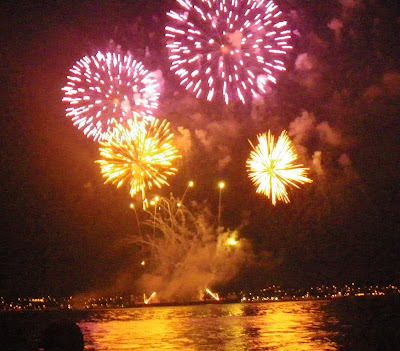This weeks podcast is available HERE.
50th International Eucharistic Congress and Lourdes Diocesan Pilgrimage 2012 - Sharing thoughts and experiences
 Fr Michael and Reena joined us on the programme this week to share their experiences of what happened at IEC2012 and also the diocesan pilgrimage to Lourdes. For Fr Michael some of what struck him about the Congress was the atmosphere of friendship between those who were attending the Congress. He was also struck by the atmosphere of prayer and opportunities for prayer which were provided through out. But also the many different ways of praying that are available to people which was demonstrated by the many stands in the main exhibition hall. For many people it was also an experience of quiet hope being nursed and supported. It was a week of friendship with each other that being friends with Christ offers us; truly a manifestation of communion. The openness to other people like what happens on pilgrimage to Lourdes, allows the Lord to be the Lord of our Hearts and allow every one in; the challenge of course being to continue to let people in when we return home.
Fr Michael and Reena joined us on the programme this week to share their experiences of what happened at IEC2012 and also the diocesan pilgrimage to Lourdes. For Fr Michael some of what struck him about the Congress was the atmosphere of friendship between those who were attending the Congress. He was also struck by the atmosphere of prayer and opportunities for prayer which were provided through out. But also the many different ways of praying that are available to people which was demonstrated by the many stands in the main exhibition hall. For many people it was also an experience of quiet hope being nursed and supported. It was a week of friendship with each other that being friends with Christ offers us; truly a manifestation of communion. The openness to other people like what happens on pilgrimage to Lourdes, allows the Lord to be the Lord of our Hearts and allow every one in; the challenge of course being to continue to let people in when we return home.Reena worked as a volunteer at the Youth Space as a greeter and welcoming them to the Congress. Youth Space was located at the Simmonscourt Pavilion and was a place of welcome for young people from 16 - 25 years old. The days were ful of prayers, workshops and uplifting music provided by Elation Ministries. Very much a place full of infectious energy and enthusisim.
The Lourdes pilgrimage was a huge success this year and was a great example of inter-generational interactions. It was an experience of festival to remind us that the church has joyous occassions. and also a sharing of experiences between young people which validated their experiences of faith for young people in these difficult times.
Fr Michael and Reena can be heard here
Limerick Diocesan website is hosting pictures from the 2012 pilgrimage
Gospel - Mark 5: 21 - 43
This weeks gospel reading is a Gospel of healing. It is a presentation of the mystery of the presence of Jesus - which is a healing presence. It is a reminder to us that that healing presence is still present in his Word and in the thanks giving and self giving of the Eucharist. Faith requirement for healing - Jesus would and could heal us. Each of us would like to reach out and touch the hem of his cloak, but that doesnt mean necessarily that in our lives we will have instantaneous response to our prayers and intercession to Jesus. Freeing power of Jesus encourages us not despair; all of us are subject to fraility, Jesus encourages us to not be afraid but to have faith.
Other reflections on this weeks gospel:
Blue Eyed Ennis
Word on Fire
Sunday Reflections
English Dominicans
Centre for Liturgy
Liturgical Odds and Ends
From CatholicCulture.org: The month of July is dedicated to The Precious Blood of Jesus. The entire month falls within the liturgical season of Ordinary Time, which is represented by the liturgical color green. This symbol of hope is the color of the sprouting seed and arouses in the faithful the hope of reaping the eternal harvest of heaven, especially the hope of a glorious resurrection. It is used in the offices and Masses of Ordinary Time. The last portion of the liturgical year represents the time of our pilgrimage to heaven during which we hope for reward.
Popes Intentions for the month of July
General prayer intention for July is: "That everyone may have work in safe and secure conditions".
Mission intention is: "That Christian volunteers in mission territories may witness to the love of Christ".
Divine Office - Psalter Week 1
Saints of the Week
July 1st - St Oliver Plunkett
July 2nd - St Swithin
July 3rd - St Thomas (Apostle)
July 4th - St Elizabeth of Portugal
July 5th - St Antony Mary Zaccaria
July 6th - St Moninne, Virgin or St Maria Goretti (First Friday)
July 7th - St Maelruain, Bishop and Abbot








